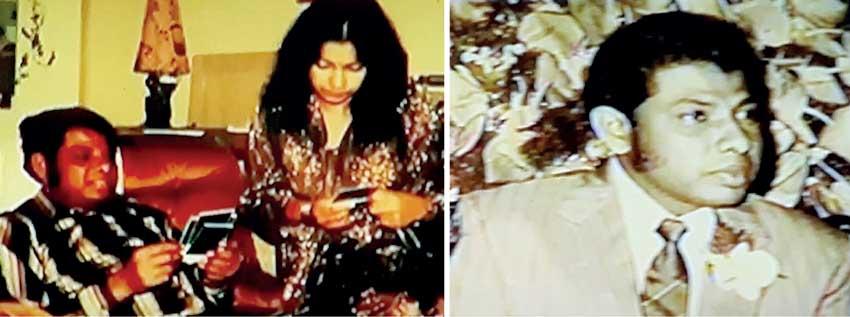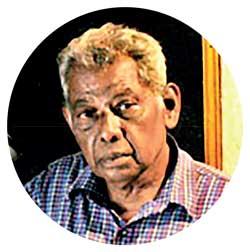18 Feb 2021 - {{hitsCtrl.values.hits}}

 G.D.L. Perera, (better known as GDL,) the veteran filmmaker, dramatist and theatre-specialist, passed away on Sunday in a hospital in London. He was ailing for sometimes.
G.D.L. Perera, (better known as GDL,) the veteran filmmaker, dramatist and theatre-specialist, passed away on Sunday in a hospital in London. He was ailing for sometimes.
Best known for his Dahasak Sithuvili (1968,) GDL’s creations shone both on stage and screen. In 1964, he won the Award for the Best Stage Play for his Thotupola at the then Annual Drama Competition organized by the Department of Cultural Affairs.
His first black and white film Mehev Lovak with Leoni Weerasinghe as its heroine along with Gamperaliya” was invited in 1965, for screening at the Commonwealth Film Festival in London. Dahasak Sithuvili again in black and white and with Henry Jayasena and Nilanthi Wijesinghe in the main roles, won him the coveted Best Director’s Award at the Annual Sarasaviya Film Awards in 1968 while the Film Critics’ and Journalists’ Guild – a powerful body at the time, awarded the film The Best Script, The Best Cameraman and The Best Editing including a Special Award for the Best Production.
But at the end of his exercise, taking a hard look at the futility of his efforts of ten years, he decided to return to London, where he once again engaged himself in drama and film production of the BBC and in motion pictures

Soon after, he made Romeo Juliet Kathawak in Technicolor.
However, it was Dahasak Sithuvili that paved the way for him to become the first Lankan to follow a six-months’ course in Film Appreciation organized by the UNESCO at the famed Film Institute of India in Poone where lecturers included celebrated Indian filmmaker Satyajit Ray.
And on the strength of the success of Dahasak Sithuvili, GDL in 1969 was also awarded a full-time two-year scholarship by the British Council to study all aspects of the film industry at the London School of Techniques. Sumitra Peries was the only other Sri Lankan to have followed a course at this specialised institution.
With job opportunities flowing on the completion of this scholarship, GDL joined the famous Pinewood Studio in Buckinghamshire which made James Bond, Spielberg films, The Titanic and The Superman series in which GDL functioned as Assistant Production Manager.
Three years later, he joined the leading film distribution group Classic Cinemas. His next break came eight years later when he was appointed General Manager of the Lumiere Cinema Circuit, the flagship of the LCC located in London’s plush West End and of the National Film Theatre of the British Film Institute which was screening outstanding films as Royal Charity Shows.
GDL in 1996, was responsible for the screening of Carmen – the film version of the opera under the patronage of the Duchess of York.
GDL’s last crossover was to the BBC when GDL joined BBC’s South-East Asian programmes in 1990 as Sandeshaya’s Art Critic.
GDL returned to Sri Lanka as the BBC’s Marketing Manager with the BBC opening a regional office in Colombo. Five years later, however, GDL wound up with the BBC as its Regional office shifted to Delhi. Despite all other work, GDL continued to make films. He made Chakkayudda in 2000 and Hora Police soon after.
In the field of telefilms, his TV series Ratagiya Aththo got a primetime slot on Rupavahini in the 1980s but his children’s film done in English titled Peter of the Elephant which he made in Sri Lanka for a foreign company and shot with a local cast of child actors and with veterans in the calibre of Joe Abeywickrema and Malani Fonseka although was screened in the West, has not yet been screened in Sri Lanka. GDL said that if it cannot be screened in our theatres due to technical reasons, it could be shown on TV.
He returned to Sri Lanka in 1980 with the hope of establishing a Residential Theatre School to train young theatre aspirants as there lacked such a school in Sri Lanka.
He bought two and a half acres of land on the banks of the Victoria Reservoir in the village of Karaliyadde in 1986 but has received no response from the relevant authorities, he abandoned the idea. But when he set out on his own and commenced the construction of the school, he faced innumerable obstacles.
He was blocked by the then bureaucracy and was in fact charged in courts on the grounds that a property developer from London, had encroached on crown land and was building on land allocated for the Mahaweli project. The case dragged on for two years and although GDL won the case, he, disheartened, eventually returned to London and joined the BBC in 1990.
But by 2002, the buildings on his land had come up, was stocked with priced sophisticated equipment and all facilities GDL had ordered originally. He returned to Sri Lanka once again and without seeking further assistance, set up the Meda Dumbara Kalagaraya and along with his wife Gitanjali nee Pilapitiya, commenced training the poor, underprivileged youth from the surrounding villages in all aspects of acting and production, free of charge.
In his Kalagaraya, GDL made ten productions – two teledramas and two stage-plays including a revival of his former award-winning stage play Thotupola with youth from the surrounding villages. His black and white film Lakshmi, Maya and Sugath is one where GDL’s cinematic creativity and the poignancy of the theme were eloquently portrayed by a dedicated amateur cast of Sinhala and Tamil girls and boys. These students were all given training in all aspects of cinematic and theatrical art.
Some of these productions were staged and screened at the Punchi Theatre, Borella for invitees with copies of the productions given to relevant authorities in order to seek an opening for these young actors.
But at the end of his exercise, taking a hard look at the futility of his efforts of ten years, he decided to return to London, where he once again engaged himself in drama and film production of the BBC and in motion pictures.
His studio in Karalliyadde built for the advancement of the arts was sold but even after he left Sri Lanka, he was hoping that those in the right places will take remedial measures and use the studio for the purpose it was built.
Alas, no such efforts were evident and he became among many more disappointed expatriates who failed to accomplish the goal to serve their motherland.
27 Nov 2024 13 minute ago
27 Nov 2024 17 minute ago
27 Nov 2024 35 minute ago
27 Nov 2024 1 hours ago
27 Nov 2024 2 hours ago